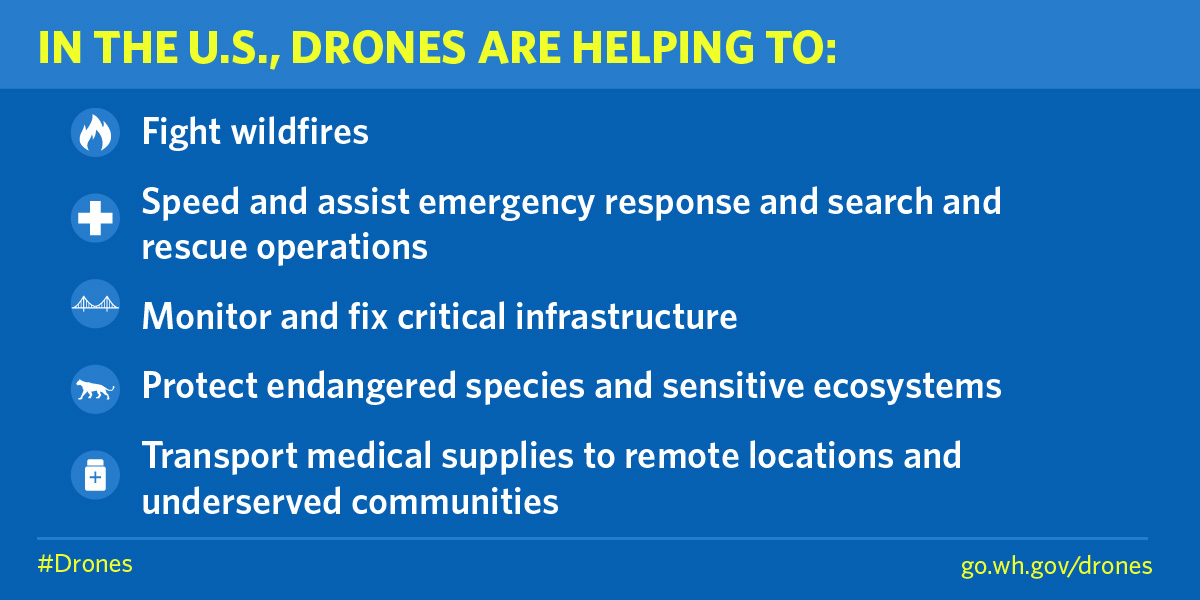
Today, the White House Office of Science and Technology Policy (OSTP) is hosting a workshop on Drones and the Future of Aviation—the first-ever event of its kind at the White House—to advance and celebrate the potential of unmanned aircraft systems (UAS), or drones. The event will gather experts from government, industry and the academic research community in order to accelerate opportunities and address challenges posed by this emerging technology.
Watch Live: The White House OSTP Workshop on Drones and the Future of Aviation
At today’s event, U.S. Chief Technology Officer Megan Smith, Federal Aviation Administration Administrator Michael Huerta, and Intel Chief Executive Officer Bryan Krzanich will deliver keynotes underscoring the significant potential of drones to positively impact the U.S. economy and create jobs, the fast-moving evolution of UAS technology, and the many emerging applications of this technology. Other leaders from industry, academia, and government agencies like the National Aeronautics and Space Administration, the Department of the Interior, and the National Oceanic and Atmospheric Administration will present on the work of the government in advancing research and development on airspace integration and UAS to over one hundred and fifty experts in the audience.
OSTP also announced a series of actions, sustained by public and private support, to promote the safe integration and innovative adoption of unmanned aircraft systems across the United States. These announcements include actions that expand the Federal Government’s capacity to use unmanned aircraft operations to advance agency and department missions and accelerate research discoveries related to airspace integration, state government commitments to support an emerging unmanned aircraft industry, and private actions to enhance mobility, expand participation, and promulgate privacy best practices, including:
- $35 million in research funding by the National Science Foundation (NSF) over the next five years to accelerate the understanding of how to intelligently and effectively design, control, and apply UAS to beneficial applications. This will include areas such as monitoring and inspection of physical infrastructure, smart disaster response, agricultural monitoring, the study of severe storms, and more;
- A broad range of actions by the U.S. Department of the Interior (DOI) to use UAS to support search and rescue operations, to augment manned aircraft operations, and improve government processes around technological adoption;
- A $5 million down-payment by the state of New York to support the growth of the emerging unmanned aircraft systems industry across New York; and
- A collective commitment made by UAS industry associations to implement a broad educational effort around privacy best practices for users of UAS technology, among other private-sector commitments to support UAS technologies.
Over the course of the day, workshop participants will discuss a wide-ranging set of opportunities and challenges related to airspace integration, technological advancement, emerging applications, privacy, security, and safety. We hope that the workshop will result in a set of new ideas and collaborations that we anticipate will accelerate technology and new applications, and generate data that will inform the next phases of regulatory development to enable the safe integration of UAS into the National Airspace System.
Since the start of this Administration, the U.S. Government has been pioneering UAS platforms and applications that are helping save taxpayer money, conserve critical resources, and even save lives. With the crucial teamwork of the research and development community and industry, the Federal Government will continue to work to enable advancements in UAS technology and help realize the positive impact of this technology on the American economy and on all of our lives.

Ted Wackler is the Deputy Chief of Staff and Assistant Director in the White House Office of Science and Technology Policy.
Evan Cooke is a Senior Policy Advisor in the White House Office of Science and Technology Policy.
Terah Lyons is a Policy Advisor in the White House Office of Science and Technology Policy.

